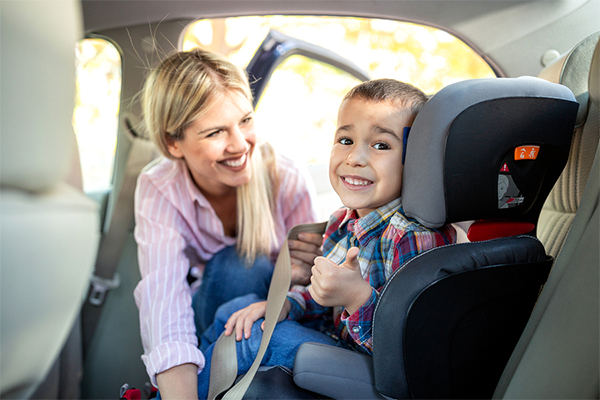As one of the best ways to protect kids when it comes to car safety, it’s important we take the proper precautions to ensure kids are secured in the right car seat for their height, weight and age. The “Ultimate Car Seat Guide” from our partner Safe Kids is a great place to start with personalized tips for your child – safekids.org/ultimate-car-seat-guide/. But did you know other factors may contribute to the safety of child passengers? In addition to car seat safety, you may want to also consider the following:
Parents/Caregivers Need to Buckle Up
You are the models for your kids. Be sure to set a good example and buckle up every ride, every time. If parents or caregivers do not buckle up, children are also statistically less likely to buckle up. Wearing your seat belt prevents ejection and spreads crash forces over a wide area of the body, to the strongest parts of the body.
Airbags
The best practice is to keep all children in the back seat until their 13th birthday to minimize the risk of injuries related to airbags. In Georgia, children are required by law to be in the backseat until age 8. Remember, airbags help passengers during a crash, but they only work if the occupant is buckled up and seated correctly at the time of the collision.
Projectiles
Any object that is not secured in a vehicle can become a projectile in a crash; in other words, any unbuckled passengers can endanger everyone else in the vehicle as they become a projectile in the event of a crash. Remember that weight X speed = restraining force, the amount an object/person will weigh in a collision. If a child uses a booster seat and it is not equipped with lower anchors, it is best to buckle it up when the child is not using it.
Unused Seat Belts
Unused seat belts can pose an entrapment/strangulation hazard. To reduce this risk, you can buckle any unused seat belts and lock the retractor.
Unattended Children in Vehicles
Never leave a child alone in a vehicle for any length of time for any reason. Children’s bodies heat up three to five times faster than adults’ bodies. For every five minutes a vehicle sits in the sun, the temperature inside the vehicle increases by 10 degrees. You should also lock your vehicles and keep keys out of the reach of children. If a child goes missing, check vehicles, trunks, and bodies of water first.
At Children’s Hospital of Georgia, kids come first! To learn more visit augustahealth.org/kids.
Sources: Safe Kids, noheatstroke.org, GA Highway Safety




